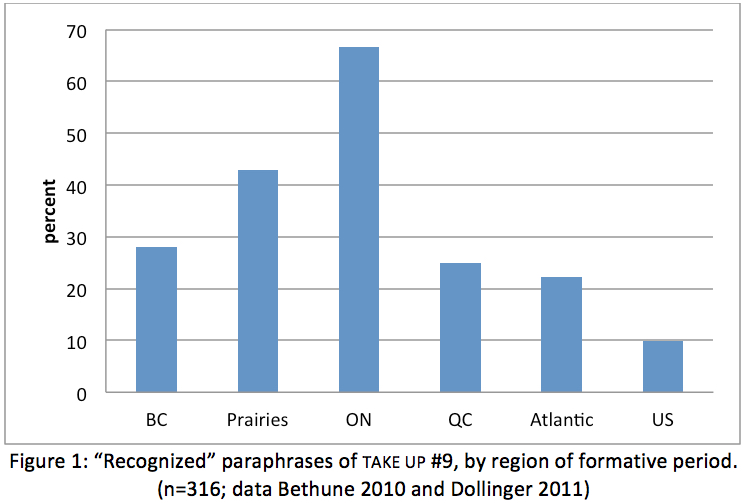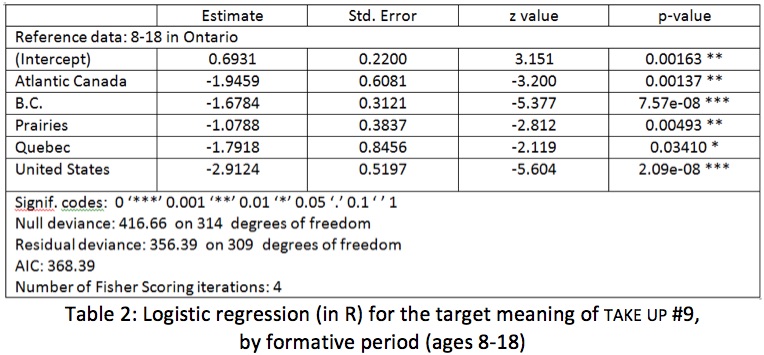Quick links
take up
DCHP-2 (Jul 2016)
v. — phrasal verb, Education, especially Ontario
to go over the answers to homework or a test, quiz or examination.
Type: 1. Origin — This sense of take up is identified as Canadian by virtue of frequency and most likely origin. Originating in Ontario, the meaning is now found in other parts of Canada, but occurs only rarely in the US (see Chart 1). No connection to the UK or the US has been found, which makes this meaning Canadian by Origin (Type 1). Older uses may be traced back via present-day self-report surveys from elderly speakers, who would have used the construction when they were young adults. Such data (Dollinger 2016) dates the construction back to the 1950s, with the key factor being in residence at ages 6-22 in an area where this sense of take up is used.
See also COD-2, s.v. "take up (9)", which defines the term as, "go over the correct answers to (homework, an assignment, a test, etc.)", but does not label it in any way.
See also COD-2, s.v. "take up (9)", which defines the term as, "go over the correct answers to (homework, an assignment, a test, etc.)", but does not label it in any way.
Quotations
1994
Mr. Keenan wants to take up the answers to the just-returned test on immigration policy, but John refuses to sit down since his customary seat near the rear window is occupied.
2000
At the large high school, we had eight 35-minute classes each day. The teachers never greeted you with a hello; in fairness to them, they didn't have the time. They only had enough time to take up the homework and assign more work for the next day. Then we were off to the next class. Besides, with so many students, how could they remember everyone's name?
2005
The class is taking up the answers to a worksheet of fill-in-the-blanks.
When they get to life expectancy, Ms. Beach reminds them how different parts of the world aren't as fortunate as Canada.
"You understand that in some countries I'd be dead and you'd be married and have kids," she tells them.
The class is taking up the answers to a worksheet of fill-in-the-blanks.
When they get to life expectancy, Ms. Beach reminds them how different parts of the world aren't as fortunate as Canada.
"You understand that in some countries I'd be dead and you'd be married and have kids," she tells them.
2009
Wed, 04 Nov
Taking up the homework questions
First in-class writing prompt
Writing a Complete Paragraph
Prepare for your quiz that will be held on Friday.
2010
Wednesday, April 7, 2010
[...] French 7: We spent the entire class taking up "Tout Ensemble" together.
2013
I'll repeat what some others have said: study when you are at your optimum, you are there to learn, it does you no good if you're tired or stressed. Take practice tests (and most importantly spend a lot of time taking up the test) at whatever time works for you. Like Quincy said, treat your body like a machine and get plenty of rest, eat well and exercise so you function optimally.
References
- Dollinger (2016) • Article (galley proofs)
- COD-2
Images

Chart 1: Take up #9 in North America (source: Dollinger 2016: Figure 1)
